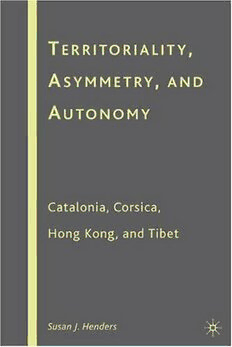
Territoriality, Asymmetry, and Autonomy: Catalonia, Corsica, Hong Kong, and Tibet PDF
286 Pages·2010·2.038 MB·English
Most books are stored in the elastic cloud where traffic is expensive. For this reason, we have a limit on daily download.
Preview Territoriality, Asymmetry, and Autonomy: Catalonia, Corsica, Hong Kong, and Tibet
Description:
Minority special status arrangements figure prominently in efforts to articulate universality with territorialized difference in many parts of the world. Yet much of what has been written about this important modality of the asymmetrical state has focused exclusively on the liberal democratic West. This book extends the analysis. It offers a structured-focused comparison of the experience of the People’s Republic of China, France, and Spain. Case studies on central Tibet, Hong Kong, Corsica, and Catalonia are used to identify the conditions that affect the degree to which special status arrangements enhance stability while improving the citizenship of both minority territorial communities and their more vulnerable residents.
See more
The list of books you might like
Most books are stored in the elastic cloud where traffic is expensive. For this reason, we have a limit on daily download.
